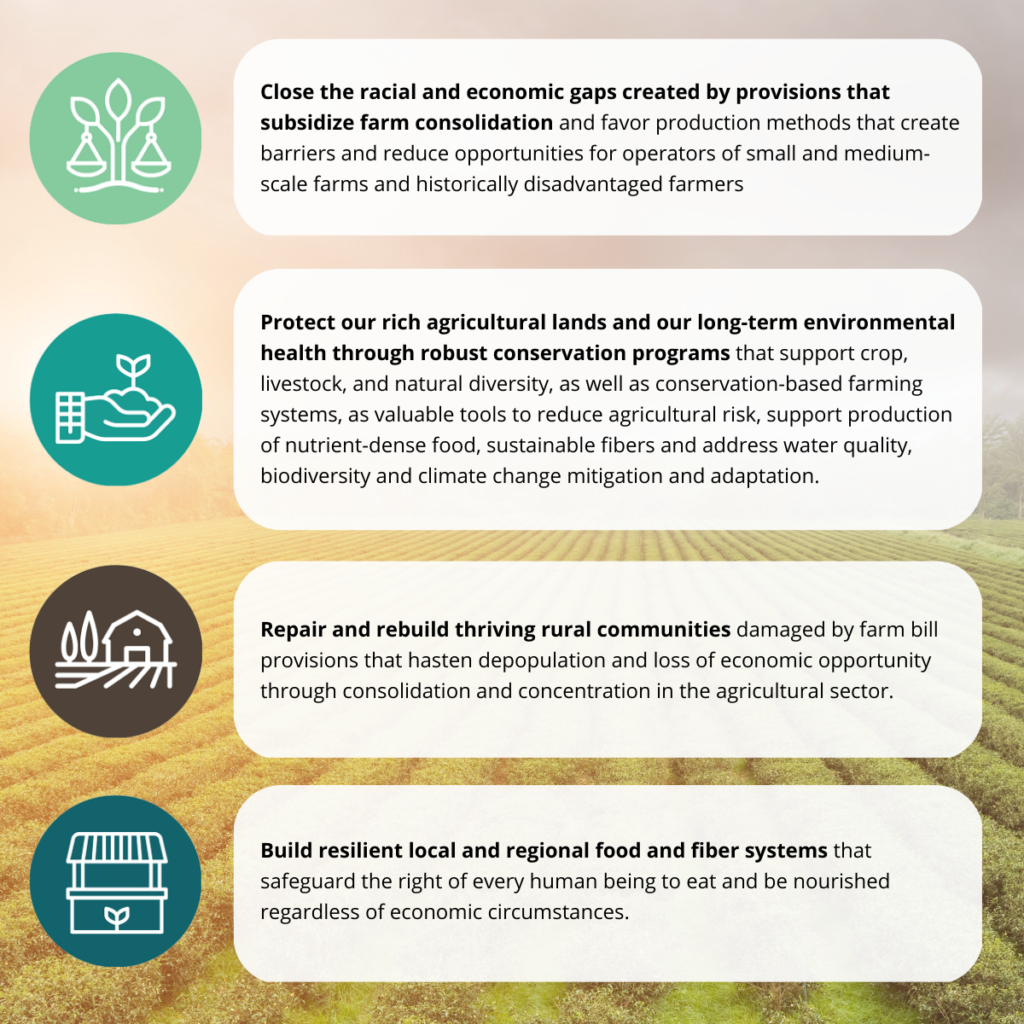Public Policy Engagement
Public policy has a hand in driving outcomes in every aspect of agriculture and food system issues where philanthropy engages – access to healthy foods, small farm viability, local and regional food systems, rural community development, environmental toxins, safe workplaces, food sovereignty, fundamental rights to self-determination, and more.
Additionally, structural inequities within our agriculture and food system result in disproportionately negative impacts on specific people and communities – low-income, rural, and people of color. Such outcomes are not accidental – they have been driven by public policy at the federal, state, and local levels. Philanthropic investment and engagement in public policy development and advocacy are critical to shifting that dynamic, and indeed, has catalyzed much of the progress made in recent years on sustainable agriculture and food systems.
SAFSF works to engage the full capacity of philanthropy in public policy. Our policy programming helps funders policy skills and knowledge while fostering collaborative action and building relationships with policymakers at the federal and state levels around areas of interest.
SAFSF 2023 Federal Policy Principles
Sustainable Agriculture and Food System Funders (SAFSF) is the leading national network for philanthropic grantmakers and mission-based investors working in support of just and sustainable food and agriculture systems. Our members include community and corporate foundations, private foundations, health conversion foundations, investment organizations, individual donors and investors, and more. SAFSF members make investments at local, regional, state, Tribal, national, and international levels to support activities and strategies related to justice, farms and farming systems, environmental sustainability, markets, health, agricultural products, and much more within the food system.
The farm bill, which is set to be reauthorized in 2023, is the most significant piece of legislation Congress enacts (roughly every 5 years) that has a direct impact on farming livelihoods, how food is produced, what kinds of foods are grown, and how economically distressed families eat. The 2018 Farm Bill includes twelve titles that cover commodity crops support, conservation of natural resources, nutrition, access to credit, rural communities, research and education, forestry, energy, horticulture, crop insurance, and beginning and historically disadvantaged farmers and ranchers, among other things. The breadth and scope of the farm bill likely touches more American lives than any other legislation.
We believe federal policy should support just and sustainable agriculture, food and fiber systems, in which it is possible for all people to equitably participate in and benefit from these economies. The following principles must be applied to the farm bill in order to make progress toward this goal.
Policy Engagement at the 2023 SAFSF Forum
Funders in the SAFSF network log many miles every year walking fields with farmers, or in communities across the country working with those directly on the ground building sustainable agriculture, food, and fiber systems. For the first time, however, nearly 100 funders from 34 states walked the halls of Capitol Hill to visit with 33 different Congressional offices, as well as staff members of the House and Senate Agriculture Committees. Representing philanthropies investing $3.1 billion annually in the U.S. and internationally, funder representatives discussed the SAFSF Federal Policy Principles. In addition, funders highlighted how philanthropy and the federal government can work together to make our agriculture, food, and fiber systems more sustainable and productive for the benefit of farmers, communities, and a healthy population.
To view recordings from the 2023 SAFSF Forum click here.
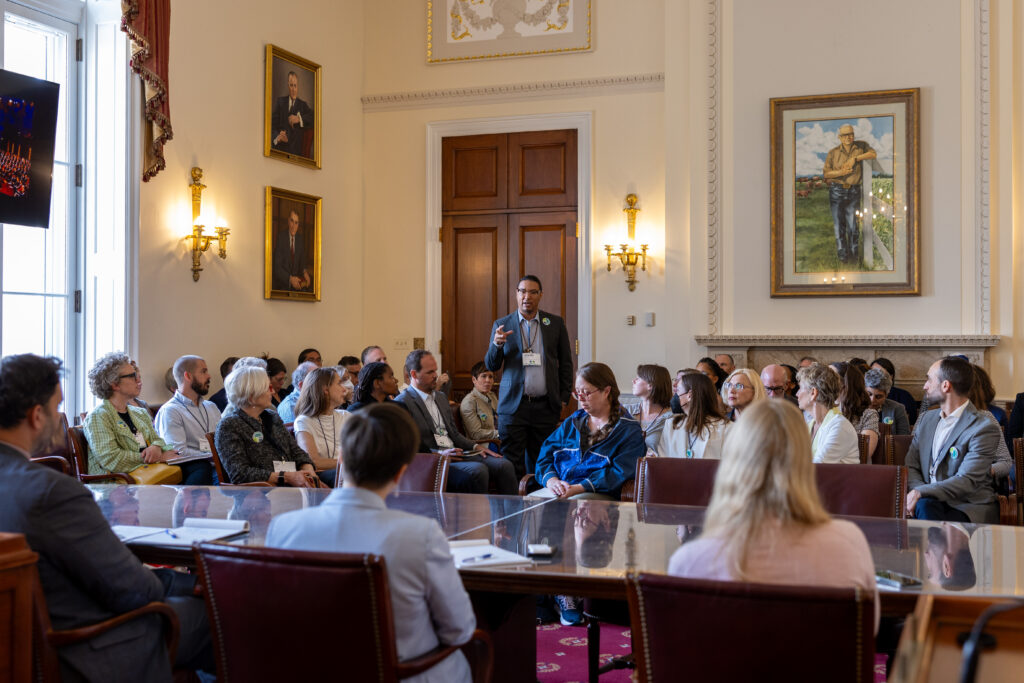
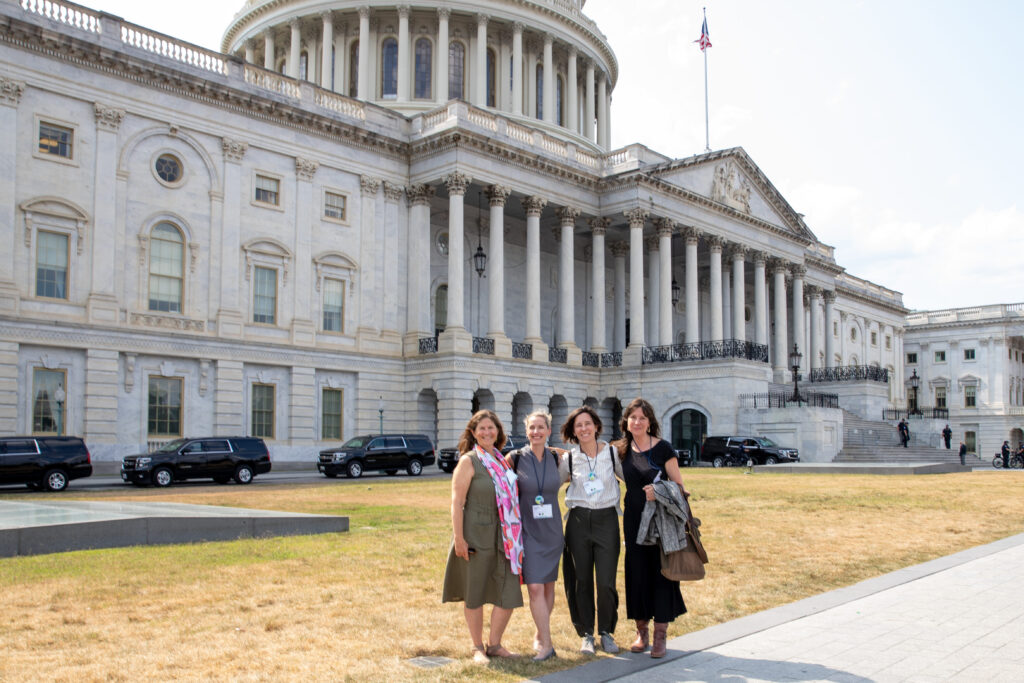
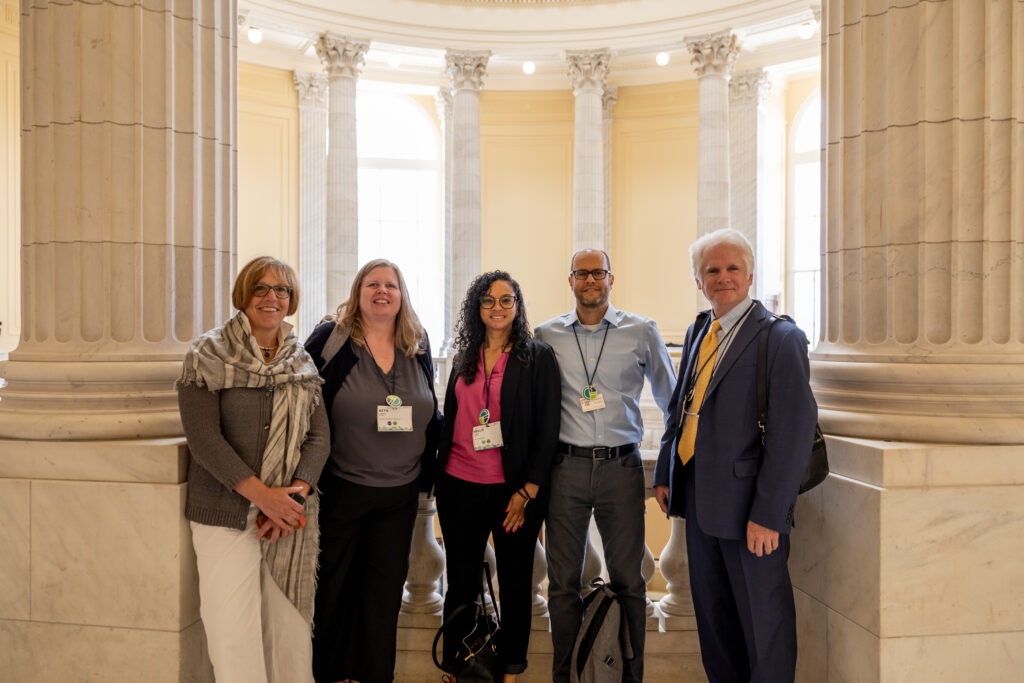
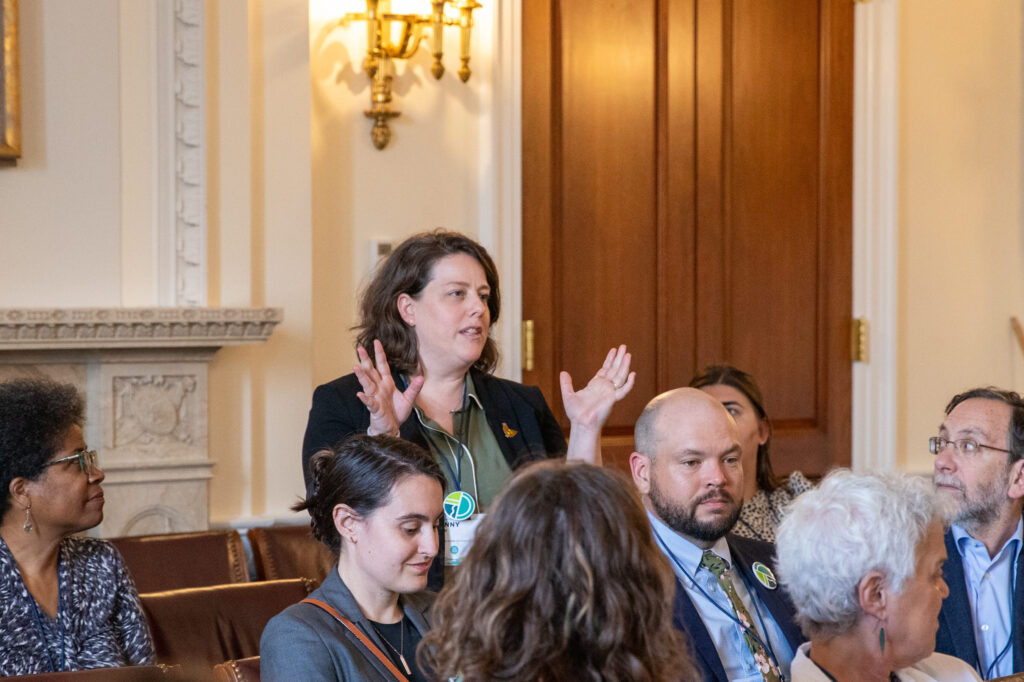
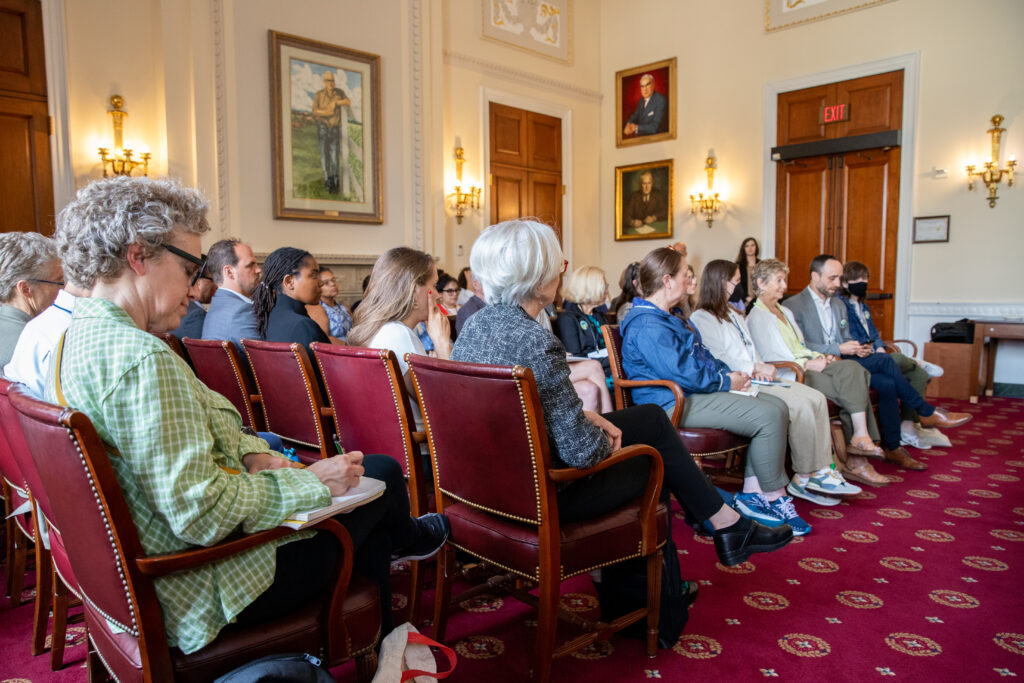
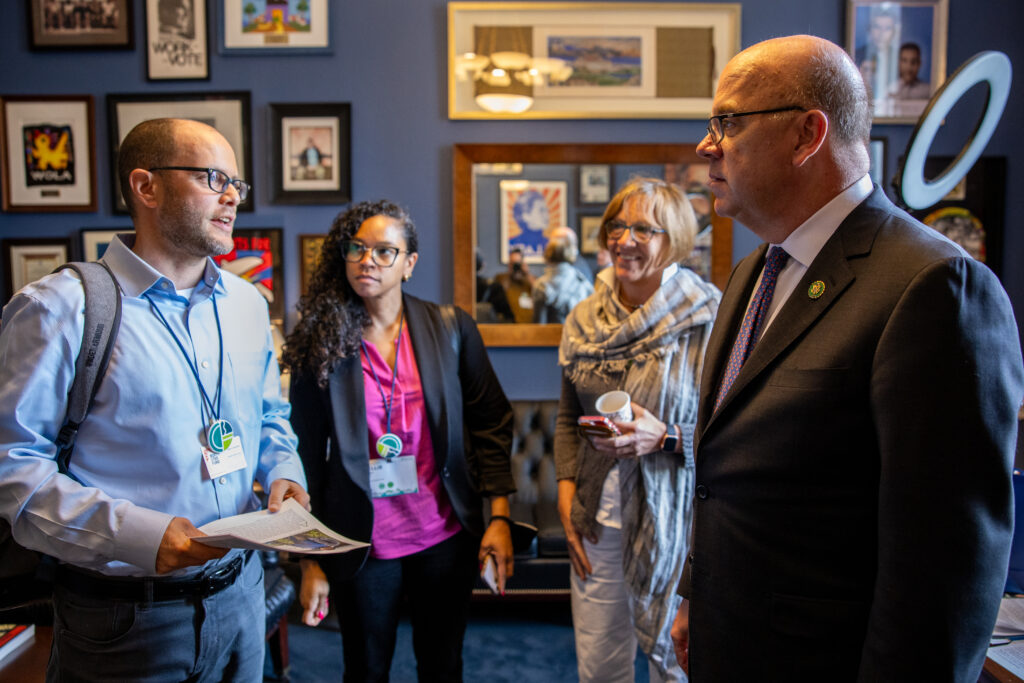
SAFSF Sustainable Fibers Farm Bill Platform—Policy Options
Sustainable fibers — produced by farming operations that use sustainable cropping or grazing systems, or other systems and practices beneficial to natural ecosystems — play a major role in the U.S. agricultural economy. This can include plant-based fibers like flax, hemp, and cotton, animal-based products like wool, alpaca, and leather, and natural dye products like plant extracts.
Yet, these crops and the small to midsize farmers and ranchers who produce them, are often overlooked in current U.S. agricultural policy. At the same time, petroleum-derived fibers (polyester, nylon, and other synthetics) now make up over 64% of global fiber production. In other words, nearly two-thirds of all the fibers we wear and use are made from oil. Rebuilding and revitalizing U.S. sustainable fiber production and processing, known as “reshoring,” can address this trend.
The upcoming 2023 Farm Bill provides a key opportunity to integrate sustainable fibers more directly into federal agricultural policy to expand eligibility and access for small and midsize fiber farmers and ranchers. As is the case with U.S. agricultural policy as a whole, this need is particularly critical for fiber farmers who are Black, Indigenous, Latinx, Asian, and otherwise marginalized by a lack of access to federal resources.
The following policy options include no-cost tweaks — those that would not require new congressional appropriations — that could be made to existing farm bill programs, including some at the regulatory level, to address the gaps and levers identified in the SAFSF Fibers Roadmap and by our partners. In addition, the Sustainable Fibers Revolving Loan Fund Pilot Program would be a new provision that would help close the gaps that exists in accessing capital and technical assistance specifically designed for sustainable fiber producers. Full document is available below.
To learn more please reach out to Clare Fox, executive director.
SAFSF Policy Convenings
2022 Policy Convening
The 2022 SAFSF Policy Convening: Commit to Action brought funders together to build shared understanding and mobilize a commitment to action to drive equitable federal agriculture and food policy change in the farm bill. Together they explored three high-impact fundable strategies: geographic power and base building; narrative shift; and policymaker education and advocacy.
This convening challenged participants to coordinate their 2022-2023 funding to leverage policy change that drives us towards resilient, sustainable, and equitable food systems—while at the same time, providing the opportunity to build strategic partnerships so that no one organization is going it alone.
2020 Policy Convening
The Sustainable Agriculture and Food System Funders community engaged in a new and compelling way during the 2020 Policy Outlook and Funder Strategy Conference. There has never been a more important time to come together. Federal policy, and the farm bill in particular, has an outsized impact on our agriculture and food system. We know we are stronger when we are in this together and we are grateful for your commitment to reimagine how we might inspire federal policy advocacy to build a just and sustainable agriculture and food system.
We hope this policy convening served to strengthen your connections, foster collaboration on federal policy, and build capacity for our policy work. You gave your time, energy, and best ideas at the convening—they are all documented in this report for our collective use.
The report is available for SAFSF members and participants of the 2020 Policy Outlook and Funder Conference. SAFSF members may download the report by using the button below, you will be redirected to login into your member portal.
Success Stories From the Field
Download our latest publication showing how small farmers, farmers’ markets, distributors, small businesses and philanthropy collaborated and engaged through federal and state programs to support food access and food security, to mitigate climate change, and to invest local economies, either in response to the pandemic or in preparation for the resilience which we know will be needed to weather future crises.
Learn More & Stay Connected
Policy Connection is SAFSF’s member newsletter that combines information and analysis on the policy issues facing the agriculture and food sectors, with a particular perspective on the role of philanthropy in informing, shaping and responding to policy actions at the federal and state levels. SAFSF members can access the Policy Connection Archive, with the full text of past newsletters. Click the “Member Login” button above.
Maggie Mascarenhas, public policy associate
